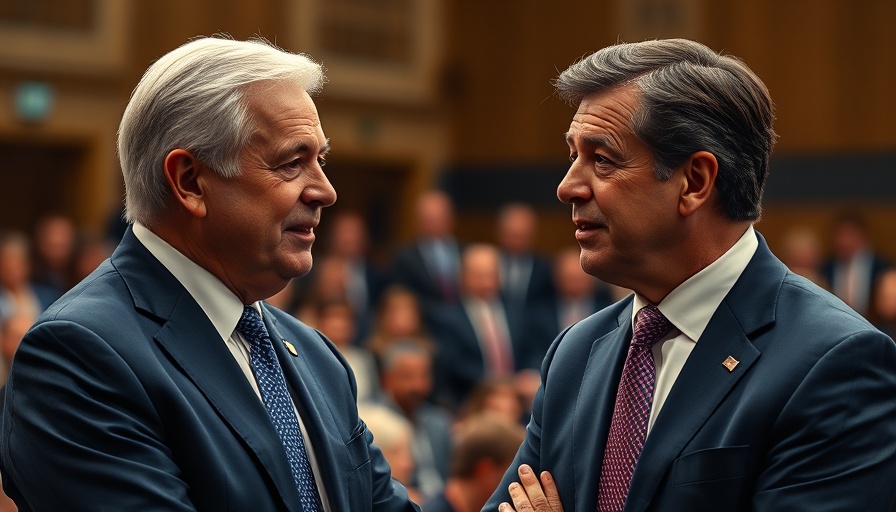
Chasing Shadows: The Exhaustion of Democratic Strategy
As President Donald Trump resumes a dominating presence in American politics, the Democratic Party finds itself in a precarious position, exhausted by a relentless pursuit of every deviation and outburst. Their well-known strategy of mounting a vigorous opposition has devolved into a myriad of reactions, leaving them vulnerable in the current political landscape. The urgency of their response has birthed a sense of chaos, blurring the line between effective oversight and sheer exhaustion.
Historical Context: The Trump Presidency’s First Act Revisited
In the early days of Trump’s first presidency, a concept known as “flooding the zone” characterized Democratic responses, where a barrage of criticisms was unleashed following each of Trump’s tweets and executive orders. However, the approach fell short of its goals, failing to sway public opinion significantly. House Minority Leader Hakeem Jeffries warned his party early on about the need to streamline their messages and focus more on substantive issues that resonate with voters’ daily lives, such as inflation and job security.
Economic Concerns as Rallying Points
The Democratic Party is now prioritizing economic issues to re-establish its foothold among disillusioned voters. This strategy stands in stark contrast to the ideological battles that defined their early attempts to resist Trump. Economic frustration, driven by skyrocketing inflation and rising living costs, has pushed many constituents toward the Republican narrative, creating a pressing need for Democrats to recalibrate. As Jeffries articulated, Democrats must expose Trump’s purported economic reforms as mere topics that boast superficial appeals rather than practical solutions.
Trump's Disruptive Strategies: A Study in Dissonance
In Trump's second tenure, the speed and style of his tactics have prompted critiques not just from Democrats but also analysts. His administration's actions often display a mix of aggressive posturing and abrupt reversals, characterized as both “shock and awe.” This dizzying pace not only overwhelms the opposition but also complicates their ability to mount coherent responses, effectively fracturing Democratic unity. The years of political turmoil establish a backdrop for how effectively party leaders can curate a winning narrative against the cacophony of Trump's governance.
Counterarguments: The Risks of Overexposure
Democrats' fixation on Trump’s actions could have detrimental effects. The party risks losing sight of broader legislative agendas and essential issues that resonate with voters—the economy, healthcare, and infrastructure. As noted in recent discussions among Democratic strategists, a strategic shift is needed that balances critique of Trump with the introduction of viable alternative policies. Progressives in the party caution that a singular focus on Trump may further alienate voters who feel neglected by a party they see as often reactive but rarely proactive.
Voter Sentiment: What Do Constituents Really Want?
The shift in voter preferences is a significant factor that could either bolster or cripple Democratic chances in upcoming elections, particularly the midterms. Many working-class families are voicing their dissatisfaction with both parties, citing the need for tangible improvements in governance rather than reactions to Trump’s latest media grab. This disconnect presents a crucial moment for Democrats—to listen and adjust their strategies accordingly. Focusing on community-focused initiatives and championing the issues that impact daily lives will prove fundamental to their success.
Future Predictions: Democrats on the Precipice of Change
As the political landscape evolves, Democrats face the challenge of transforming their strategies. A clearer, more organized narrative coupled with principled stances on critical issues could help regain the confidence of swing voters. The party's ability to create and sustain dialogue on economic reforms, voter turnout implications, and campaign financing will determine its relative success in future elections. They must also effectively communicate their vision for a modern American democracy that prioritizes citizens’ needs over partisan affiliations.
Conclusion: The Path Forward
In a political climate dominated by the controversies surrounding Trump, the urgency for Democrats to reshape their narrative cannot be overstated. They must disentangle themselves from a purely reactive posture and reinforce their commitment to advocating policies that directly impact the American people. As celebrations and grievances continue to oscillate, their success moving forward will depend on their ability to cultivate clarity and consistency in their messaging, ensuring that they are not merely shadows in the chase.
 Add Row
Add Row  Add
Add 




Write A Comment